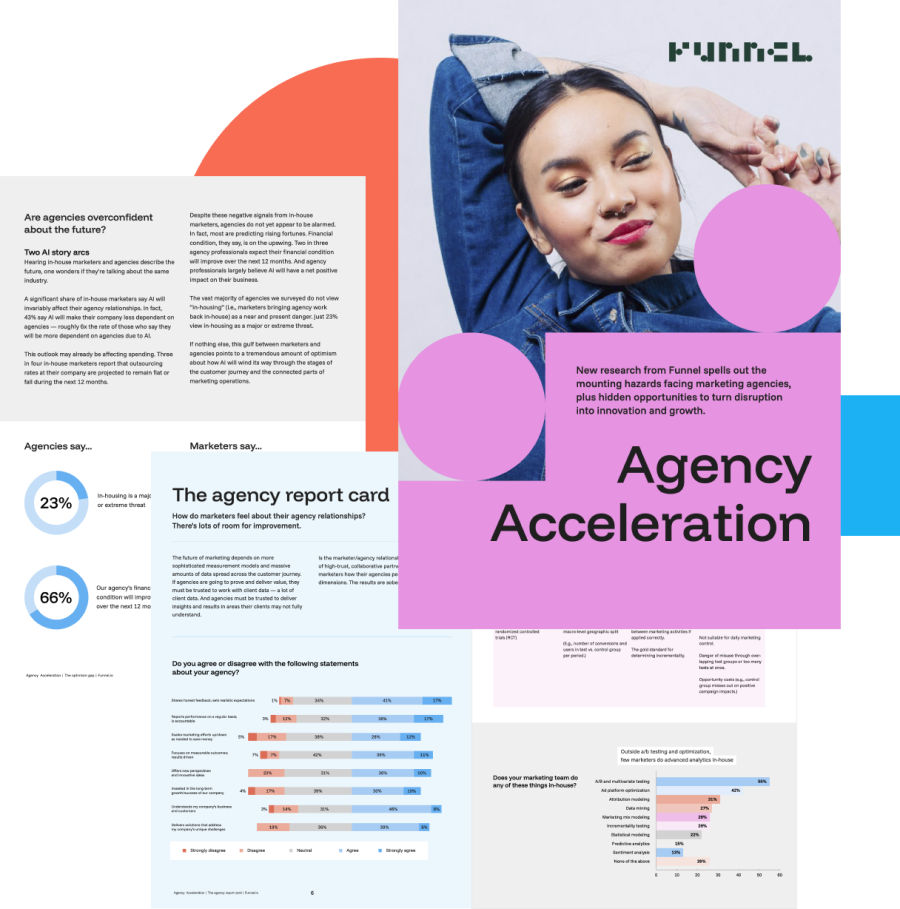-
 Written by Sean Dougherty
Written by Sean DoughertySenior Brand Creative at Funnel, Sean has more than 15 years of experience working in branding and advertising (both agency and client side). He's also a professional voice actor.
Marketing teams and agencies have always had a dynamic push/pull relationship. Sometimes, things can get rocky, and other times this partnership helps produce stunning, award-winning work.
However, as the marketing industry continues to evolve, new pressures have arisen and started to affect the marketer-agency relationship. Some of the biggest game changers have been advanced analytics (think: multi-touch attribution) and artificial intelligence. So, we embarked on a quest to understand how these new market factors are weighing on marketers and agencies with our latest research report, Agency Acceleration.
And the results are quite stark.

Click the button below to download your copy of Agency Acceleration and learn how agencies can position themselves for the future of marketing.
Download the report now
Click the button below to download your copy of Agency Acceleration and learn how agencies need to position themselves for the future.
What is the report about?
The report draws upon quantitative and qualitative research from 327 in-house marketing professionals and marketing agency leaders, examining existential challenges to agencies. Funnel and market research firm Ravn Research found that marketing agencies are facing a triple threat: pressure from regulators and Big Tech, shortages of advanced analytical skills and changing perceptions about the value of agencies themselves, with AI and automation replacing human work in some instances.
AI is becoming more prevalent in marketing
Artificial intelligence seems to be inescapable lately — and perhaps no industry is more affected than marketing. In fact, many in-house marketers say AI will invariably affect their agency relationships.
As many as 43% of marketers say AI will make their company less dependent on agencies. Agencies, meanwhile, are largely unfazed. Two-thirds of agency professionals expect their financial condition to improve over the next year, with AI having a net positive impact on their business.
At the same time, less than a quarter of agency respondents view increased in-housing of marketing functions (partially resulting from AI adoption) as a major threat to their business. Something doesn’t quite add up there.
Agencies facing mistrust from clients
It’s no secret that the most effective modern marketers run their operations on a solid foundation that is fed by data. That also means the future of marketing will be dependent on sophisticated measurement models that require vast amounts of data needing to be shared between clients and agencies. The only way to survive and thrive will be for agencies to build closer relationships to their clients.
However, our report shows a general mistrust in agencies and a frustration with repetitive processes on the clients’ side.
More than half of in-house marketers don’t trust their agency partnerships, particularly when controlling costs and delivering tailored, innovative solutions. To make matters worse, a whopping 75% of marketers claim that their company’s outsourcing rates to agencies will fall or remain flat over the next year.
Additionally, only 40% of marketers say their agencies are invested in the long-term growth and success of their company; just 47% believe their agencies are communicating well on measurable outcomes. Marketers did note, however, that agencies were better at sharing honest feedback and setting realistic expectations.
“Our agency is in the business of making sense of data analysis, AI, machine learning, language models, and more”, explains Benjamin Keller, chapter lead data and business intelligence at Sunlab. “What can be difficult is presenting it in a way that clients can understand and synthesize.”
Agencies’ golden opportunity
As the last-click attribution method used for measuring marketing impact is slowly eroded by regulatory and Big Tech data limitations, many marketers now face uphill battles to evolve to advanced analytics and rely less on third-party data.
Innovations in advanced analytics, used in marketing, come in three forms:
- Marketing mix modeling (MMM) uses statistical models to measure the impact of marketing activities on business outcomes such as sales and ROI.
- Incrementality testing estimates the additional impact of a specific campaign or activity by comparing the results of a test group exposed to the campaign with a control group that was not.
- Multi-touch attribution deploys user-level and micro-level tracking to assess user journeys and the impacts of individual touchpoints.
These advances are catching some marketers on the back foot. Our research shows that marketing teams generally do not have an advanced analytics expert to inform decision-making. For example, 69% of marketers surveyed say they have no clear, documented roadmap to adapt to the deprecation of third-party cookies
Since their clients do not have experts or roadmaps to track performance, most agencies (66%) therefore believe that offering advanced analytics is a major opportunity for their organization.
Approximately 60% of marketers are already using some kind of data analytics to measure performance. But very few are using the most advanced probabilistic forms, such as MMM (26%) and incrementality testing (26%).
Very few marketers (15%) have plans to outsource additional advanced analytics services in the coming 12-18 months, leaving the majority with reduced visibility on the impact of marketing spend
While many in-house marketing teams require help from agency partners to pull new strategies off, agencies themselves can spread the costs of domain experts across multiple clients, explain methodologies behind their recommendations and guide clients through the complex marketing landscape.
A critical point for action
The industry may be more uncertain than ever but as Con Cirillo, our head of US marketing, puts it, the time is now for agencies to step up their game.
“This report comes at a critical crossroads for the industry,” says Con Cirillo, head of marketing, United States, at Funnel. “With AI on the rise, cross-device and web tracking falling and marketing teams reassessing their budgets, it is important to examine the relationship between in-house marketers and agency partners.”
To learn more about the pressures on agencies and marketers, the full agency report card and to discover how agencies can better position themselves for future success, download Agency Acceleration now.
-
 Written by Sean Dougherty
Written by Sean DoughertySenior Brand Creative at Funnel, Sean has more than 15 years of experience working in branding and advertising (both agency and client side). He's also a professional voice actor.
